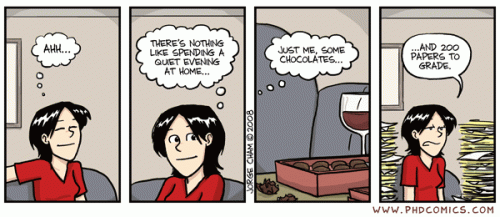
There. I said it.
Most of us got into our profession because we love teaching. When we design courses and lessons, when we interact with our classes in discussion, when we see the look of wonder on our students’ faces at the moment of significant learning, we feel a charge of accomplishment and authentic meaning. Sometimes we feel that in the best student essays we read, too. And then…
What kills us a little each time is different for different teachers. Maybe it’s the frustration of noting the difference between genuine student struggle and a genuine lack of effort. Maybe we chafe at the instructions unfollowed, or the writing mechanics still unmastered (and unproofread). Or maybe it’s just the mountain of paper at the start of the process. Mountain climbers may climb the mountains because they are there. We aren’t freaking mountain climbers. We never asked to be, we never trained to be… and the threat of the seemingly insurmountable task can hit many of us (especially the serial procrastinators among us, myself included) with a sense of paralysis.
Of course, pro mountain climbers don’t just gambol out into the wilderness with a rucksack and a jaunty song and start climbing. Through knowledge of appropriate equipment and safety rules, and the wisdom that comes from reflective practice, they have learned how to prepare and proceed in order to reach the summit most effectively — at the right pace, applying the best practices, and avoiding the slippery spots that can send the unwary off the edge. And by climbing those mountains in the right way, the pros can forego the dread of “inevitable” risk and enjoy the purpose of the climb.
Rick Reis of the tomorrows-professor listserv introduces us to a fellow climber, Brian Martin of the University of Wollongong. He reminds us of some important best practices in essay grading that can keep us safe and sane, and thus help us approach grading’s true purpose: as the assessment-as-teaching needed for effective student learning.
__________________________________________________
Folks:
The posting below gives some excellent advice on how to approach the task of marking, or grading, student essay assignments. It is from the September 8, 2014 issue of the postings on a blog by Brian Martin, professor of social sciences in the Humanities and Social Inquiry department at the University of Wollongong, Australia, and is reprinted with permission. More information about his blog and how to subscribe can be found at: http://comments.bmartin.cc.
Regards,
Rick Reis
reis@stanford.edu
Marking (Grading) Essays: Making it Easier and More Fun
It’s worthwhile discovering methods to make marking more enjoyable. The same methods can be used to tackle other dreaded tasks.
Sitting on your desk is a pile of essays that need to be marked. There might be just 10 or 20, or maybe 50, 100 or more. For most teachers, this is not an eagerly awaited task. Is there some way to make marking easier and more enjoyable?
I’ve been marking undergraduate essays for over 25 years and have tried out various methods to make the task less onerous. Gradually I’ve discovered ways that work well for me. You may or may not want to adapt these for your own circumstances. In any case, I encourage you to undertake your own search for better methods. If you’re looking ahead at 25 years of marking, surely it’s worthwhile to explore better ways to go about it.

